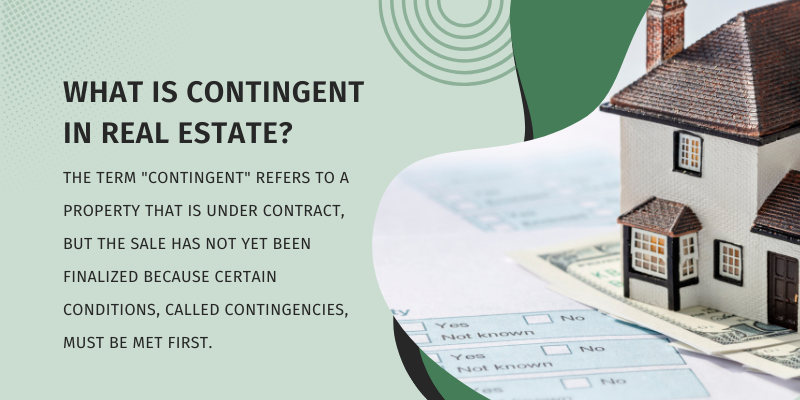What does contingent mean in real estate is a common question for home buyers and sellers navigating the property market.
The term “contingent” refers to a stage in the home buying process where a seller has accepted an offer, but certain conditions must be met before the sale is finalized.
These conditions, known as contingencies, act as safeguards to protect both parties during the transaction.
For buyers, understanding a contingent status is essential because it helps them know whether they can still make an offer or need to wait for the current deal to move forward.
In the world of digital marketing, similar concepts of contingencies apply in various strategies, such as those employed by an oil and gas marketing agency, which ensures safeguards and assessments in project development before moving forward.
Common contingencies include financing approval, home inspections, appraisals, or the sale of the buyer’s current home.
If these conditions are not met within the agreed timeline, the deal may fall through, allowing the seller to entertain other offers.
For sellers, contingencies provide structure and protection, ensuring that buyers are serious and financially ready. However, they also mean the sale isn’t guaranteed until all conditions are resolved.
This blog explores the different types of contingencies, how they affect buyers and sellers, and what steps you can take to navigate this stage of a property transaction smoothly.
But first, let’s explore what does contingent mean in real estate?
What is Contingent in Real Estate?
In real estate, the term contingent refers to a property that is under contract, but the sale has not yet been finalized because certain conditions called contingencies must be met first.

These contingencies are safeguards that protect both the buyer and the seller during the transaction, ensuring that the deal moves forward smoothly and fairly.
When a home is listed as contingent, it means the seller has accepted an offer, but the property is still in an intermediate stage of the buying process.
The final closing depends on whether specific requirements are satisfied within an agreed-upon timeframe.
Explore Our Digital Marketing Services!
5 Common Types of Contingencies in Real Estate
When a property is marked as contingent, it clearly defines that the sale depends on specific conditions being met before it can move forward to closing.
These conditions, called contingencies, protect both buyers and sellers by outlining the steps that must be completed for the transaction to proceed smoothly and fairly.
In the same way, a digital marketing agency Like Centric uses strategic measures to ensure that every step in a marketing plan aligns with a clear outcome.

Here are the most common types of contingencies you’ll encounter in real estate transactions:
1. Financing Contingency: Buyer’s Loan Approval
The financing contingency is a crucial part of many real estate transactions, as it ensures that the buyer can secure a mortgage or loan to purchase the property.
It acts as a safety net for both the buyer and the seller. If the buyer’s loan application is denied or they fail to receive approval within the agreed timeframe, they have the legal right to back out of the contract without losing their earnest money deposit.
This contingency protects buyers from being locked into a purchase they cannot afford, while also providing sellers with peace of mind knowing that the buyer is financially capable of completing the deal once financing is approved.
2. Inspection Contingency: Home Inspection Results
The inspection contingency gives the buyer the right to have the property professionally inspected before finalizing the sale.
This step allows buyers to uncover potential problems such as structural damage, plumbing issues, or electrical hazards that may not be visible during a simple walkthrough.
In the digital transformation landscape, this could be compared to evaluating your website’s current health before launching a new SEO services campaign to ensure optimal results.
If serious defects are discovered, the buyer has the option to request repairs, negotiate a lower purchase price, or cancel the contract entirely.
This contingency serves as a crucial safeguard, protecting buyers from unexpected costs and ensuring they have a clear understanding of the property’s condition before committing to the purchase.
3. Appraisal Contingency: Property Valuation
The appraisal contingency is designed to ensure that the property’s appraised value matches or exceeds the agreed-upon purchase price.
This serves as protection against paying more than the property’s worth, much like how advertisement examples are tested before a campaign goes live to ensure that content aligns with budget and audience expectations.
Lenders require an appraisal to confirm that they are not financing more than the home is actually worth, protecting both the buyer and the lender from overpaying.
If the appraisal comes in lower than expected, the buyer has several options: they can renegotiate the price with the seller, cover the difference out of pocket, or withdraw from the deal altogether.
This contingency is especially important in competitive markets where bidding wars often drive up home prices beyond their true market value, helping buyers avoid paying more than the property is worth.
4. Title Contingency
A title contingency protects the buyer from legal disputes over the property’s ownership.
Before closing, a title search is conducted to ensure there are no liens, unpaid taxes, or other claims on the property.
If issues arise, the buyer can request the seller to resolve them or terminate the contract. This step ensures the buyer receives clear ownership of the property without future legal complications.
5. Sale Contingency: Buyer’s Existing Home Sale
The sale contingency is used when a buyer needs to sell their current home before they can finalize the purchase of a new one.
It gives the buyer time to liquidate their existing property and free up funds for the new purchase. If the buyer is unable to sell their home within the agreed-upon timeframe, they can back out of the contract without facing any penalties.
These contingencies collectively serve as safeguards in real estate transactions. They provide buyers and sellers with a structured process to address potential issues, reduce risk, and ensure that everyone involved moves toward closing with confidence.
These contingencies are often comparable to the steps involved in a Marketing Strategy Trade Tariffs agreement, where different conditions must be met before the deal is finalized. The contingencies protect both the buyer and seller by ensuring that neither party is exposed to unnecessary risk.
Contingent vs. Pending: Key Differences
In real estate, the terms contingent and pending are often confused, but they represent two very different stages in the home-buying process.
Understanding these differences is essential for both buyers and sellers to set the right expectations and make informed decisions.
A contingent listing means the seller has accepted an offer, but the sale is not yet final because certain conditions, known as contingencies, still need to be met.
These contingencies could include financing approval, a home inspection, an appraisal, or even the sale of the buyer’s current home.
During this stage, the property may still be shown to other potential buyers, and backup offers can sometimes be accepted in case the initial deal falls through.
On the other hand, a pending listing indicates that all contingencies have been satisfied or waived, and the transaction is moving toward closing. At this point, the home is essentially off the market, and no new offers are typically considered.
In short, a contingent status signals that the deal is in progress but not guaranteed, while a pending status shows that the sale is nearing completion.
Knowing this distinction helps buyers decide whether it’s worth pursuing a property and helps sellers manage their expectations throughout the process.
What Contingent Status Means for Buyers
For buyers, seeing a property marked as contingent means that the home is already under contract, but the sale is not yet final.
While the seller has accepted another buyer’s offer, there are still contingencies that must be satisfied before the deal can move forward. This doesn’t mean the opportunity is lost, buyers can still take action.
For instance, in digital marketing, understanding contingent status can guide potential clients to adjust strategies, whether looking at SEO services or refining campaign ideas before final approval.
If you’re interested in a contingent property, you can submit a backup offer. This positions you as the next in line if the current deal falls through due to unmet contingencies, such as failed financing or inspection issues.
It’s also important to work closely with your real estate agent to monitor the status of the contingencies and be ready to act quickly if the home comes back on the market.
Additionally, understanding the type of contingency in place whether it’s financing, inspection, appraisal, or sale-related can help you determine how likely it is for the deal to close.
While there’s no guarantee, having a strategy prepared gives you a better chance of securing the property if the initial transaction does not move forward.
What Contingent Status Means for Sellers?
For sellers, a contingent status offers protection while keeping the sales process active. Contingencies ensure that buyers are both serious and financially prepared to follow through with the purchase.
For example, a financing contingency protects buyers if their mortgage approval falls through, while an inspection contingency gives them the chance to address any major property issues before finalizing the deal.
However, contingencies can also affect negotiations and timelines. If a contingency is not met, the buyer can legally back out of the agreement, forcing the seller to relist the property, which may delay the sale.
Because of this, many sellers prefer buyers who have fewer or no contingencies to minimize risk and move toward closing faster.
During the contingent stage, sellers have the option to accept backup offers. This adds an extra layer of security by ensuring another interested buyer is ready to proceed if the original deal falls through.
By carefully managing contingencies and staying informed throughout the process, sellers can reduce uncertainty, protect their interests, and maintain greater control over the transaction.
Final Thoughts
Understanding what does contingent mean in real estate is essential for both buyers and sellers to navigate the home-buying process with confidence.
A contingent status signals that a property is under contract but certain conditions must be met before the sale can be finalized.
These contingencies, such as financing, inspections, or appraisals, act as safeguards to protect both parties and ensure a fair and transparent transaction.
For buyers, knowing the meaning of contingent helps them decide whether to place a backup offer or move on to another property. For sellers, it provides clarity on how to manage offers, negotiations, and timelines while keeping the sale on track.
By fully understanding contingencies and their role in real estate deals, both buyers and sellers can make informed decisions, reduce risks, and create a smoother path to closing.
Whether you are buying your first home or selling a property, recognizing the importance of contingencies is key to achieving a successful and stress-free transaction.









